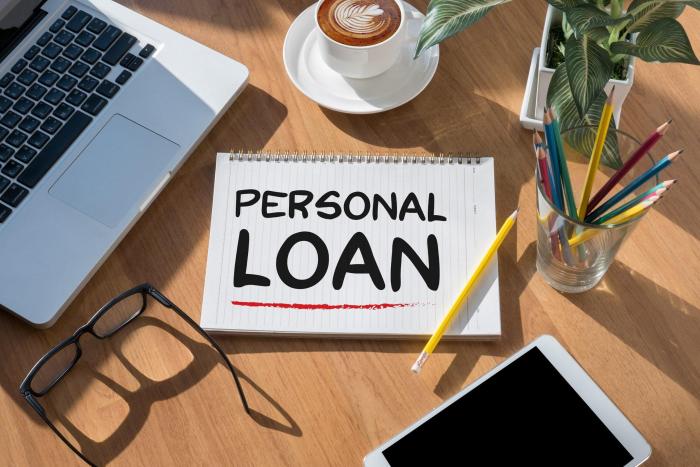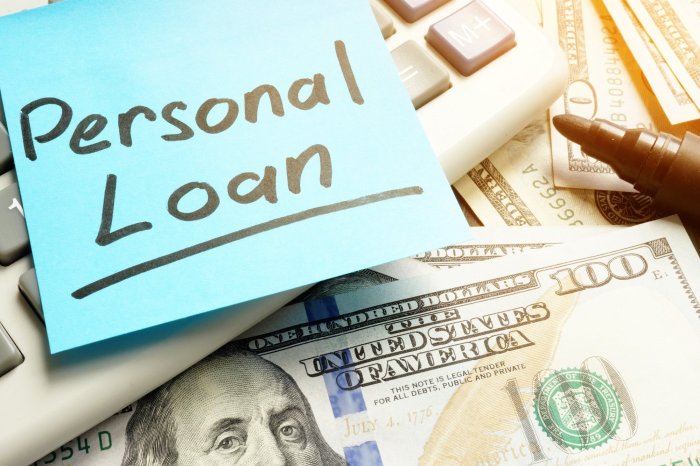Personal loans, a key aspect of financial planning, offer a gateway to achieving your goals and dreams. From understanding the different types to navigating the application process with ease, this guide will take you on a journey through the world of personal loans.
Introduction to Personal Loans
Personal loans are a type of loan that individuals can borrow from a financial institution, such as a bank or credit union, for various personal expenses. Unlike specific loans like auto loans or home loans, personal loans can be used for a wide range of purposes, making them versatile financial tools.
Common Uses of Personal Loans
- Debt Consolidation: Many individuals use personal loans to consolidate high-interest debts into one lower-interest loan.
- Home Improvements: Personal loans are often used to fund home renovation projects or repairs.
- Medical Expenses: Personal loans can help cover unexpected medical bills or expenses not covered by insurance.
Key Features of Personal Loans
- Interest Rates: Personal loans typically have fixed or variable interest rates, depending on the lender and the borrower’s creditworthiness.
- Terms: The terms of a personal loan determine the amount borrowed, the repayment period, and any fees associated with the loan.
- Repayment Options: Borrowers can choose from various repayment options, such as monthly installments or lump-sum payments.
Types of Personal Loans
When it comes to personal loans, there are various types available to suit different financial needs and situations. Let’s explore the different types of personal loans and their advantages and disadvantages.
Secured Personal Loans
Secured personal loans are backed by collateral, such as a car or home. These loans typically have lower interest rates compared to unsecured loans because the lender has the security of the collateral. Secured loans are suitable for individuals with valuable assets who are looking to borrow a larger amount of money.
Unsecured Personal Loans
Unsecured personal loans do not require any collateral and are based solely on the borrower’s creditworthiness. These loans are suitable for individuals who do not have assets to use as collateral. However, they often come with higher interest rates compared to secured loans.
Fixed-Rate Personal Loans
Fixed-rate personal loans have a set interest rate that remains the same throughout the loan term. This provides predictability in monthly payments and makes budgeting easier. Fixed-rate loans are suitable for individuals who prefer stability and want to avoid fluctuations in interest rates.
Variable-Rate Personal Loans
Variable-rate personal loans have an interest rate that can fluctuate based on market conditions. While these loans may offer lower initial rates compared to fixed-rate loans, there is a risk of the interest rate increasing over time. Variable-rate loans are suitable for individuals who are comfortable with potential interest rate changes and are willing to take on some risk.
Overall, the type of personal loan that is most suitable for an individual will depend on their financial situation, credit history, and preferences. It’s essential to carefully consider the advantages and disadvantages of each type before making a decision.
Applying for a Personal Loan

When applying for a personal loan, it is important to understand the process and what is required in order to increase your chances of approval.
Application Process
- Start by researching different lenders and their loan offerings to find the best fit for your financial needs.
- Fill out the loan application form provided by the lender, providing accurate and up-to-date information.
- Submit any required documentation, such as proof of income, employment verification, and identification.
- The lender will review your application and documentation, and may request additional information if needed.
- If approved, review the terms of the loan carefully before signing the agreement.
- Once the agreement is signed, the funds will be disbursed to you according to the lender’s timeline.
Tips for Approval
- Ensure your credit score is in good shape before applying, as it plays a significant role in the approval process.
- Provide accurate and complete information on your application to avoid delays or potential rejection.
- Consider applying for a loan amount that is within your means to repay, based on your income and expenses.
- If possible, try to reduce your existing debt or improve your debt-to-income ratio before applying for a personal loan.
- Consider adding a co-signer with good credit to increase your chances of approval, especially if your credit history is less than perfect.
Documentation Required
- Proof of income, such as recent pay stubs, tax returns, or bank statements.
- Identification documents, such as a driver’s license, passport, or state ID.
- Employment verification, which may include contact information for your employer or recent pay stubs.
- Proof of residence, such as a utility bill or lease agreement, to verify your address.
- Additional documents may be required based on the lender’s specific requirements, so be prepared to provide any requested information.
Factors to Consider Before Getting a Personal Loan

Before taking out a personal loan, there are several important factors to consider to ensure you make the best decision for your financial situation.
Credit Score
Your credit score plays a crucial role in determining the interest rate you will be offered on a personal loan. A higher credit score typically results in lower interest rates, while a lower credit score may lead to higher rates or even difficulty in qualifying for a loan.
Interest Rates
It’s essential to compare interest rates from different lenders to find the most favorable terms. Even a small difference in interest rates can have a significant impact on the total amount you will repay over the life of the loan.
Fees
In addition to interest rates, be sure to consider any fees associated with the personal loan, such as origination fees, prepayment penalties, or late payment fees. These fees can add to the overall cost of the loan, so it’s crucial to factor them into your decision.
Repayment Terms
Understanding the repayment terms of a personal loan is vital to ensure that you can comfortably meet the monthly payments. Consider the loan term, monthly payment amount, and any flexibility in repayment options to choose a loan that aligns with your financial goals.
Impact on Credit Scores
Taking out a personal loan can impact your credit score in several ways. On one hand, successfully repaying the loan on time can improve your credit score. However, missing payments or defaulting on the loan can have a negative effect on your credit score.
Financial Health, Personal loans
While personal loans can provide immediate financial relief, it’s essential to consider the long-term impact on your financial health. Taking on additional debt through a personal loan may affect your ability to save, invest, or achieve other financial goals in the future.
Alternatives to Personal Loans
When considering borrowing money, personal loans are a common choice. However, there are several alternatives to personal loans that may better suit your financial needs. Let’s explore some of these alternative financing options and compare their pros and cons.
Credit Cards
Credit cards are a popular alternative to personal loans, offering a revolving line of credit that can be used for various purchases. While credit cards provide flexibility and convenience, they often come with high-interest rates and fees.
Home Equity Loans
Home equity loans allow homeowners to borrow against the equity in their homes. These loans typically have lower interest rates compared to personal loans, but they require collateral in the form of your home.
Peer-to-Peer Lending
Peer-to-peer lending platforms connect borrowers with individual investors willing to lend money. This alternative can sometimes offer lower interest rates than traditional personal loans, but approval may not be guaranteed.
401(k) Loans
Borrowing from your 401(k) retirement account is another option to consider. While these loans do not require a credit check, they come with the risk of reducing your retirement savings and potential tax implications.
Family and Friends
Turning to family and friends for a loan is a common alternative to borrowing from financial institutions. While this option may offer more flexibility in terms of repayment terms, it can strain personal relationships if not handled carefully.





